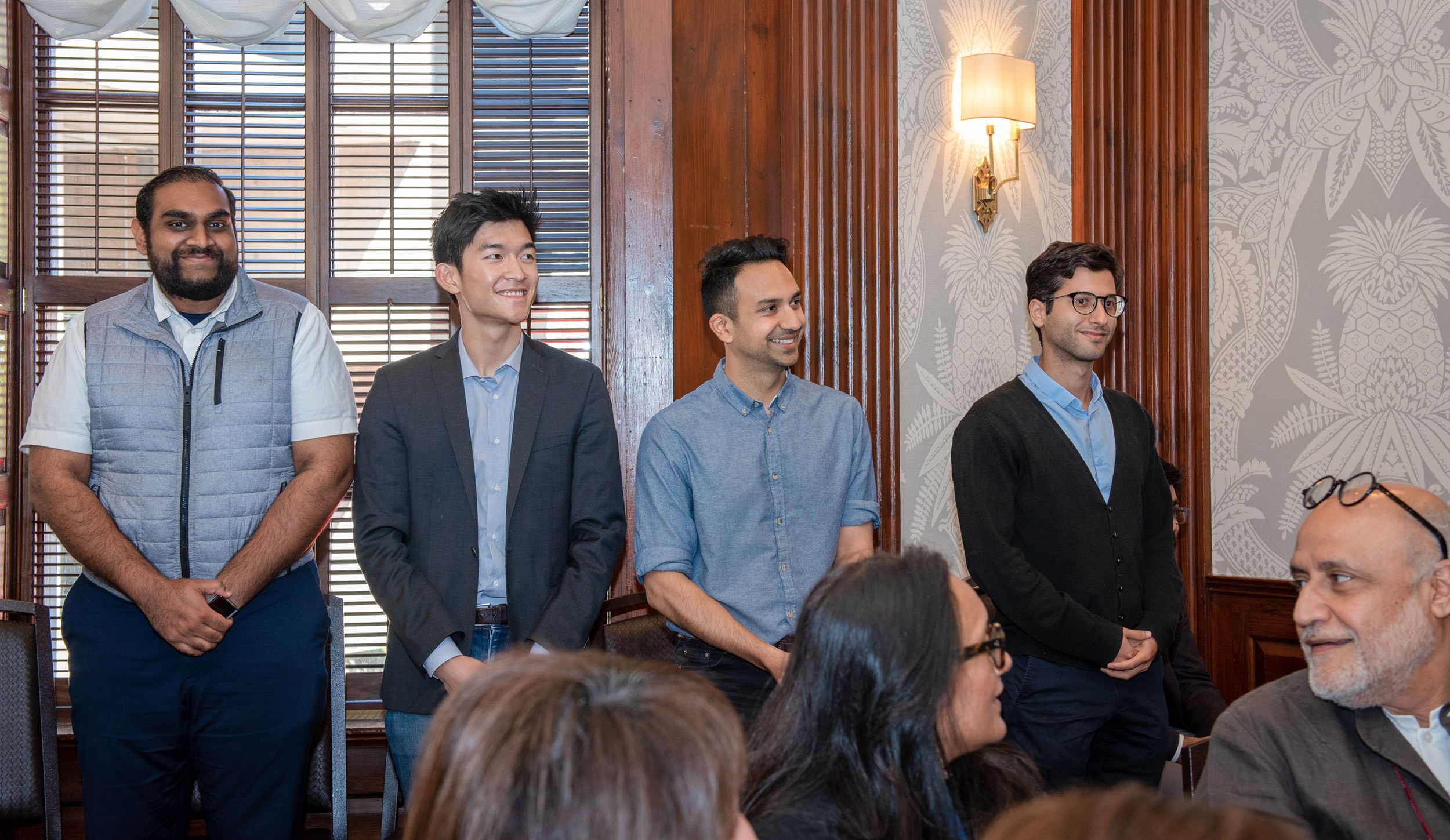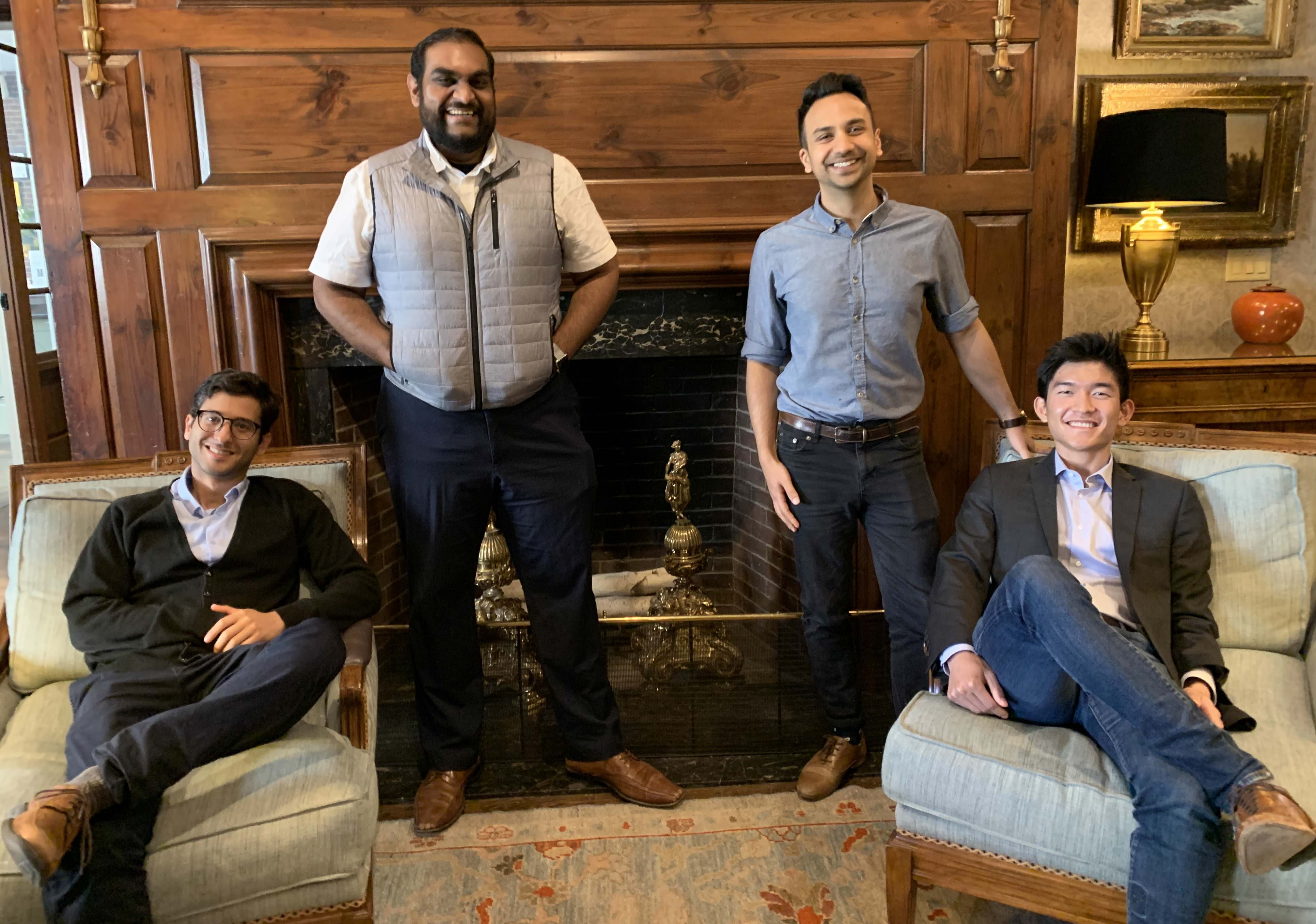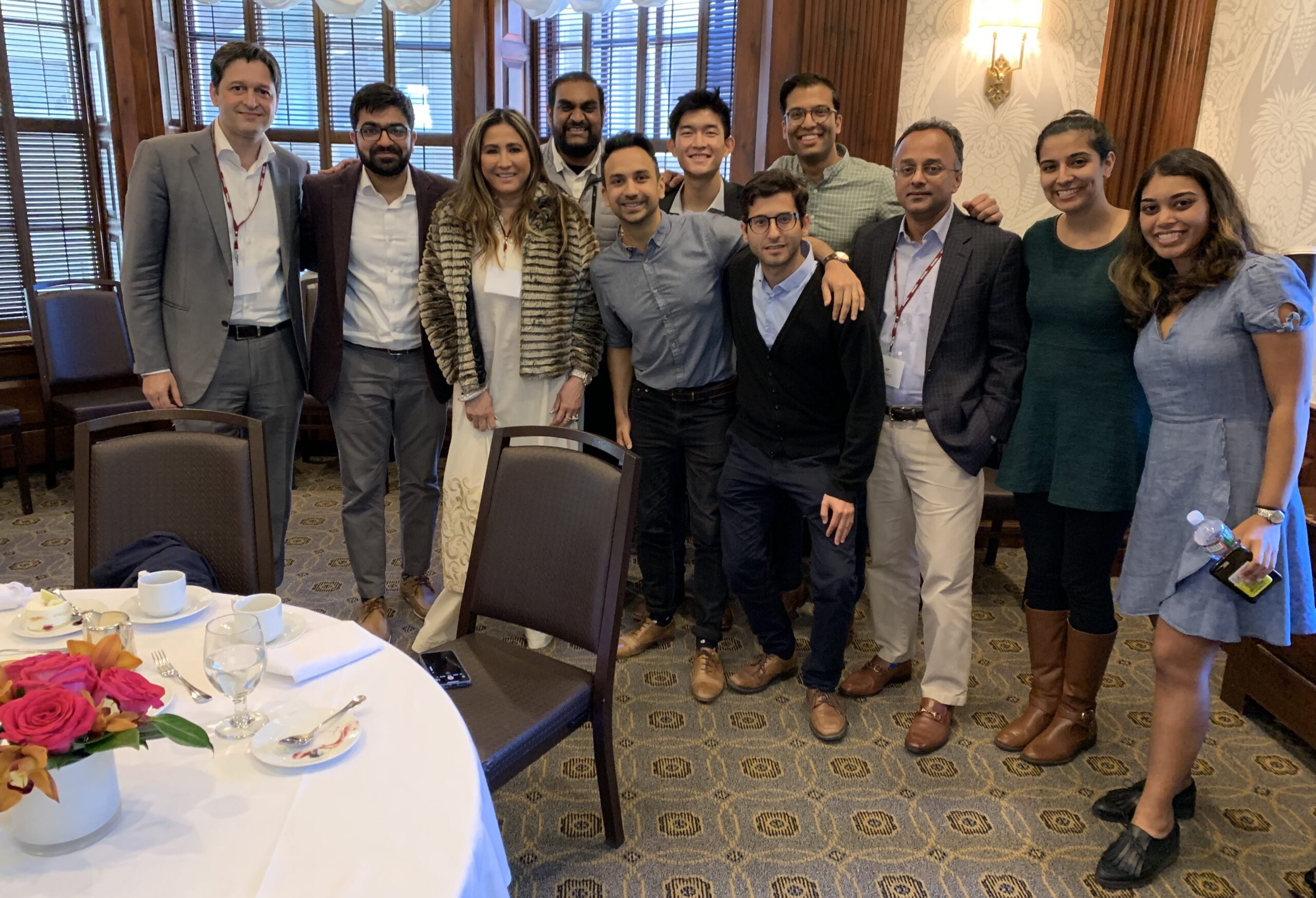
The four members of the Riskboard team are announced runners-up at the annual Seed for Change competition. From left to right: Pradeepan Parthiban, Ryan Jiang, Arjun Bisen, and Ori Pleban.
Each year, the Mittal Institute’s Seed for Change competition invites Harvard students to propose projects that can positively impact societal, economic, or environmental issues in India and Pakistan, helping to develop innovation and entrepreneurship in the two countries. This year, a close competition provided grants to one winning team and two runners-up to develop their projects. Riskboard, a runner-up, is an app in development by four Harvard students that will harness online data via social media and open source media data sites to monitor political risk and human rights abuses in India.
The teammates — Pradeepan Parthiban, ALM ’19 at Harvard and Tech + Human Rights researcher at Harvard Kennedy School; Ori Pleban, MPP ‘19 at Harvard Kennedy School; Arjun Bisen, MPP ’19 at Harvard Kennedy School; and Ryan Jiang, BA ’20 at Harvard College — come from multidisciplinary backgrounds that have helped drive the conceptualization of the app. “We have a pretty well-balanced team. I have a business background, Ori is a front-end developer, Ryan is a back-end developer, and Arjun is a political risk expert. We’ve tried to marry our human rights, business, and political risk expertise with machine learning,” said Parthiban.
With the grant from the Seed for Change competition, the team will begin a more in-depth technical development of the Riskboard app. “We need to build up the tool, so a lot of the funds will go toward development to help us build a good prototype that we can start piloting out. Then, the team can go on-the-ground and see these issues face-to-face,” said Parthiban.
What Is Riskboard?
Riskboard began in a class at the Harvard Business School with Professor Tarun Khanna. Parthiban, inspired by his prior volunteer efforts to help resolve the refugee and human trafficking crises in his home state of Texas, sought to combine this passion with his love for the high-tech sector. “One of the first assignments that we had was to define a large problem that affects a third-world country, and then solve it,” said Parthiban. His team took on the problem of forced labor, ultimately pivoting to human rights and political risk analysis.
After the class ended, Parthiban continued the project, and pulled in some new members to the group. With the help of fellow student Arjun Bisen and his expertise in political risk analysis across nations, the team came up with a plan to use technology to monitor risks to human rights around the world. “I thought, ‘what if we could automate the work of diplomacy?’ We could empower other people to build a framework around the political drivers of human rights risk, and perform direct detection early on,” said Bisen.
The team had discovered a powerful new way to enter the field. “The overall problem with the human trafficking industry is that there’s a huge demand for it, so we tried to focus on the corporate side of demand, where these companies are driven by profits and economic factors — so they have to source from third parties and can’t monitor who they’re employing,” said Parthiban. “You have to deal with so much demand created by the economics of the industry because there are no protections in those areas and companies don’t really know what’s going on. So, we felt that by empowering organizations to understand their supply chains and clean them up, it will actually reduce the corporate side of demand.”

The four members of the Riskboard team wait for the decision at the Mittal Institute annual Seed for Change competition. From right to left: Ori Pleban, Arjun Bisen, Ryan Jiang, and Pradeepan Parthiban.
Using open source media data sites like GDELT, the team can pull information from media reports around the world, across multiple languages. “That’s a firehose of data, and it’s updated on a pretty regular basis,” said Pleban. The team will also use social media to gather their reports. They can then funnel this information into the app they’re developing, which will provide corporations live updates about locations all over the world and give these organizations a way to be more transparent. But they’re not stopping at corporations — they also want to work with NGOs to improve humanitarian efforts and reporting, while giving these groups the power to hold corporations accountable and create systemic-wide change.
With so much data today from third world countries and the adoption of smart phones higher than ever, the team learned from their meetings with over 40 corporations and NGOs that these organizations are dealing with too much information. “They don’t know what’s happening in the deep-level supply-chain, they don’t know what they can do about it, and they don’t have context behind these instances. For example, it could help them understand if they want to close a plant or not due to unrest — if they had more information and understood the context, they could make a better decision, save money, help the community, and even save lives,” said Parthiban.
How Does It Work?
All of this context will be provided within the Riskboard app, which will refresh live. Unlike many reports created by NGOs every six months or a year, it will update within 5–15 minutes. “A lot of organizations are getting their information from consultancies, embassies, or other risk companies, but the information they get is periodic. The day they get it, it may already be outdated,” Parthiban said. “Having immediacy of information is a big plus — it’s a game-changer in the industry.”

All teams competing in the Seed for Change competition pose with the judges.
The team described the app and its upcoming dashboard features, including a social graph and historical data about locations. It will track social media primarily in local languages and context, while pulling themes, stakeholders, origin, timing, and other information from recent articles to create a map that connect everything. “We could look back in time and see when something was trending and if there was any corporate action then, so companies can see how other organizations reacted to something,” said Parthiban.
Though India is the first stop on the list, the team envisions that Riskboard can used on an international scale one day. “We’ll start in India, but we definitely want to go global,” said Parthiban. “With machine learning, hopefully we can create a predictive model, and one day you’ll be able to predict where it might be high risk, someone will be able to avoid something dangerous, and NGOs will be able to write better reports.”
What Are Its Potential Impacts?
Once the app goes live, the Riskboard team envisions numerous potential positive impacts related to politics, economics, and ethics. “We want to increase transparency and accountability on the corporate side. I think that has a lot of economic implications: we want people to be paid fair wages in these supply chains, we want the consumers to want to and to be able to drive demand for that by paying a premium for ethically-sourced products,” said Parthiban. “I think our tool is an enabler of fair-trade transactions. We want to see a world where every transaction is clean and ethical.”
“What we’ve learned is that just throwing money and technology at the problem doesn’t help,” said Parthiban. Their tool aims to go beyond that — to empower corporations, NGOs, and the “good guys” to balance the scales.
